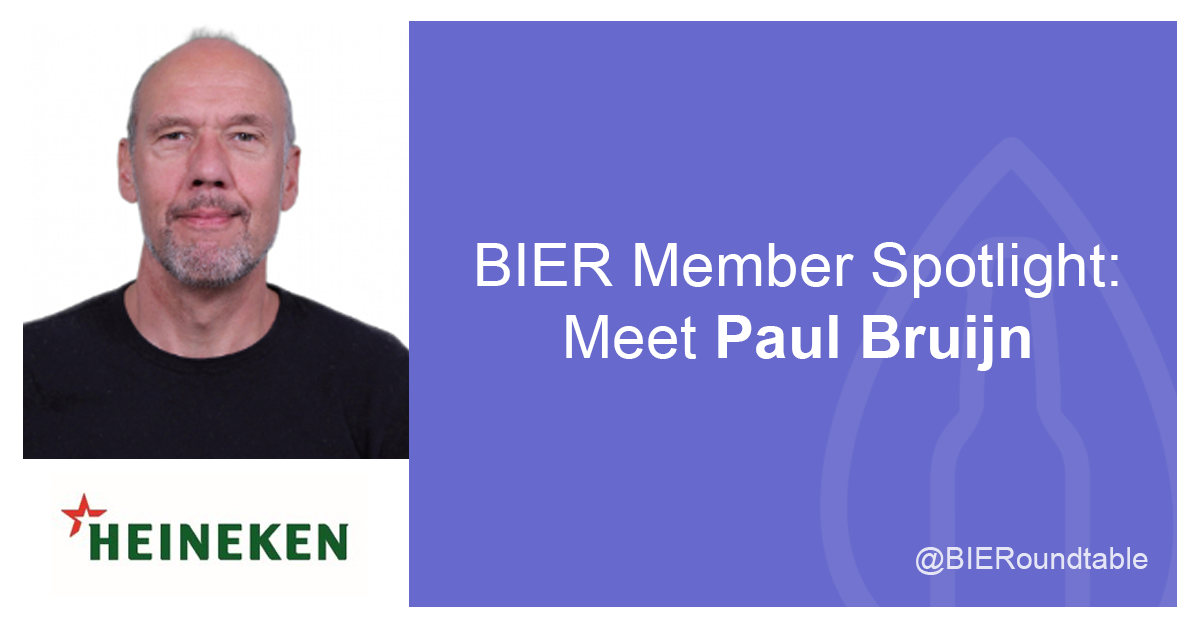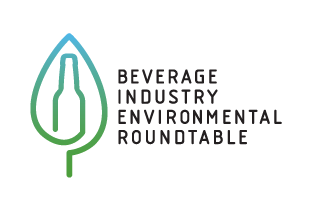BIER Member Spotlight: Paul Bruijn
Meet Paul Bruijn

Paul Bruijn, Global Lead Sustainable Production
Company: Heineken
Connect with Paul on LinkedIn
Welcome to our series aimed at spotlighting the individual leaders within BIER member companies and stakeholder organizations. Learn how these practitioners and their companies are addressing pressing challenges around water, energy, agriculture, climate change, and what inspires each of them to advance environmental sustainability in the beverage sector and collectively, overall.
Briefly describe your role and responsibilities and how long you have worked with your company.
While I have been with Heineken for 33 years, I've always worked in the environmental domain. Initially, I started as a fresh graduate of biology studies. When entering the workforce, HR had a different idea for me, but I didn’t want it! I wanted to be an environmental specialist. Fortunately, at that time, the company’s reorganizations were shaping up in a way that supported my ambitions so that I could work in the environmental field.
My current role, as I define it, is a bit somewhere between science and reality; in a sense, to be a bit ahead of the group and a bit of a strategic thinker supporting the strategies that we need to have on important sustainability topics. In short, for us at Heineken, there are three main sustainability areas where we are making reductions: climate change is the main challenge, we have a Carbon Reduction program, and we need to work on water too. The third area of importance is the move toward a Circular Economy.
Regarding climate, we have clear goals, as noted in our 2030 Brew a Better World commitments, and we are now in execution mode. Our water strategy, Every Drop Counts, is recognition for healthy watersheds, and it's not only the water efficiency that brewers have to work on but also that what we discharge can be made suitable for reuse. The circular economy is getting much more attention, especially in the European Union. It's one of the initiatives that integrate with the Green Deal and the Farm-to-Fork Strategy.
All these high-level intentions of politicians and scientists need to be translated into practical measures for brewers. These solutions need to be impactful and relevant but also scalable and affordable. So that's a part of my role: to shape the solutions as a response to the big challenges that we have.
On one hand, it's about packaging recycling, reductions of waste to landfills, but also attention for scarce materials. Last but not least we have our own co-products, brewers spent grains and surplus yeast that need to be recycled as best as possible, preferably to human food products
Keep in mind, when you're dealing with environmental topics for more than 30 years, you also grow in the, let's say, the dossiers behind them. The big challenges we are facing are not a one-day decision. The first CO2 target setting goes back to the Kyoto climate conferences and then to the EU, and later on to the Paris climate agreement. So, in a sense, as an environmental professional, you can see what is coming on the horizon in terms of important topics, challenges, and so forth.
Without the intention to offend brewers, I think what helps is that our supply chain at Heineken is pretty simple. We have a few ingredients and a few different packaging materials, and that's basically it. So our upstream processes include barley and hop cultivation and the malting of barley, as well as, the production of cans, bottles, and plastic bottles. Downstream we have fridges and beer coolers to take care of. In between all process blocks, we have logistics from trucks, ships, and trains. So it's not the most complex product that we make. With that, I think it makes addressing these pressing environmental challenges a doable thing, but also a very necessary thing! If companies with a simple supply chain cannot go to climate zero, then what can we expect from the more complex industries making more than 100 or 1000 different products or high tech or whatever?
Throughout my career, I may have had the same role with the environment, but the level of detail was different. I started as a lab assistant and as a researcher, so I had my hands in the wastewater, I had my hands in the Clean-in-Place (CIP) cleanings. I worked with brewers spent grains and yeast. And that makes it easier in a later phase to design a workshop for water efficiency and energy efficiency. And if you've done the energy efficiency thing, you can understand the carbon dioxide calculations, and then you start reading lifecycle assessment or packaging. So, one thing leads to the other. It’s obvious to me that the transition has to happen now, and it is not a few percent reduction every year - that it is really much more urgent.
How has the company's sustainability program evolved over the years, and what are your specific priorities for 2022?
There are basically two elements to consider in answering this question. Looking back, I see how Heineken went from a local player - to a European player - to a global player, and now we have 180 breweries and about 10 malting plants. That's a footprint!
Also, environmental topics evolved from, let's say, noticing local odors and smells around the brewery to environmental reporting at a time when the definitions were not very clear between brewers. Then we went to, let's say, regional environmental problems like acid rain. The focus then shifted as we engaged on global topics such as the problems with the ozone layer and the successful Montreal Protocol. Water stress issues began to surface, and now we have extended our scope not only to breweries, but we have really raised the bar with sustainability for the “barley to bar production chain.
What I'm now most proud of is Heineken’s ambition level. By 2030 we will have all our breweries and malting plants on a net zero carbon emission level, which is a huge challenge. In addition, by 2040, our supply chains need to be carbon neutral.

